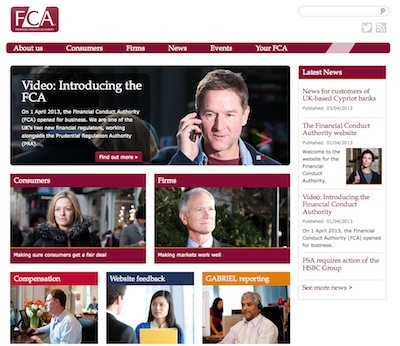The Financial Conduct Authority has published details today of its Annual Funding Requirement (AFR) for 2013/14 and says that a 15 % increase (equivalent to £86m) is required to meet additional costs for 'front line' staff, IT and support services.
It's the first full detail provided by the FCA on how much the new funding requirement will be to pay for the tri-partite self-regulatory system and reveals that costs will be higher as the FSA's role is split into three. On 1 April 2013 the FCA and the Prudential Regulation Authority (PRA) replaced the Financial Services Authority (FSA). The Bank of England, which also has new regulatory functions, has separately published the AFR for the PRA.
Overall the AFR for the FCA is £432.1m and the combined FCA/PRA AFR for 2013/14, totals £646.3m, representing a 15% increase over the 2012/13 FSA AFR of £559.8m. Currently 42% of the FCA's authorised firms need only pay the minimum fee, says the FCA, and for the fourth year running the gross minimum fee for firms will remain unchanged at £1,000 however medium-sized and larger-sized firms may pay more.
According to the FSA, medium-sized firms will see a proportionate increase reflecting the type of business they conduct. This increase will be borne mainly by larger firms, reflecting the resources applied to the intensive conduct and prudential supervision of "high impact" firms
The FCA's AFR will be used to fund much of the work that was started in the last couple of years as the FCA increases supervision of firms and delivers on its new statutory objectives while implementing key areas of the substantial international regulatory reform agenda.
The key areas that the AFR will be used for in the coming year are:
· A renewed focus on good outcomes for consumers. This will include helping to ensure that firms' strategies are aligned with producing appropriate outcomes for consumers − for example, through the work on product governance and incentive structures in firms;
· A continued focus on tackling market abuse, by taking strong enforcement action to deter future misconduct. Focusing on wholesale conduct will be critical for the FCA, as will the new approach to the supervision of trading platforms;
· Ensuring a competitive financial services industry. A significant change for the FCA, this will involve building a new Competition Department to embed competition analysis across the organisation, which will take action as appropriate;
· Continuing to address ongoing misconduct, such as LIBOR, Payment Protection Insurance and interest rate swaps; and
· Carrying forward major policy initiatives such as the Mortgage Market Review, the changes to retail investment advice and extensive engagement with Europe on important Directives under consideration.
{desktop}{/desktop}{mobile}{/mobile}
The FCA says the main reasons for the 15% increase in total combined FCA and PRA 2013/14AFR (compared to the FSA 2012/13 AFR) are the costs of increasing front line supervision staff, an increase in Information Technology (IT) costs and an increase in central support services costs.
As part of the reorganisation the PRA has moved into new premises and although the FCA has reduced its floor space accordingly it says it must retain sufficient capacity to absorb the additional people required to regulate consumer credit from 1 April 2014. Total accommodation costs in 2013/14 are therefore higher under the new regime.
The FSA made a one-off contribution in 2012/13 to reduce the defined benefit pension scheme deficit that will be inherited by the FCA. This deficit is expected to increase to around £200m at the next Scheme Specific Valuation (SSV) on 31 March 2013 and an additional contribution made now will reduce the FSA legacy and mitigate the risks of significantly increased future annual contributions.
Martin Wheatley, chief executive of the FCA, said: "Our first year as a new regulator will be an exciting and challenging time but one for which we are well prepared. We are introducing new approaches to the way we do much of our work, becoming much more proactive and consumer focussed. Much of the increase in AFR is the result of the additional resources needed to ensure the FCA delivers on its new objectives, as well as the practical costs of implementing the new regulatory structure.
"The increases will be borne mainly by larger and more complex groups with medium sized firms seeing a proportionate increase. We have, however, minimised the impact on smaller firms by keeping the minimum fee at £1,000 for the third year running. The FCA recognises the difficult economic circumstances for many firms and is committed to keeping any essential cost increases to a minimum."
The enforcement fines the FSA imposed during the previous year used to be returned to the industry by way of discounts to their fees in the following year. The amounts of financial penalties collected by the FSA in 2012/13 were £381.8mm. Following changes made by HM Treasury these financial penalties, net of certain enforcement costs (£40.6m), will now be paid to the Exchequer in April 2013.
The FCA levies fees on behalf of the Financial Ombudsman Service (FOS), the Financial Services Compensation Scheme (FSCS) and the Money Advice Service (MAS).

